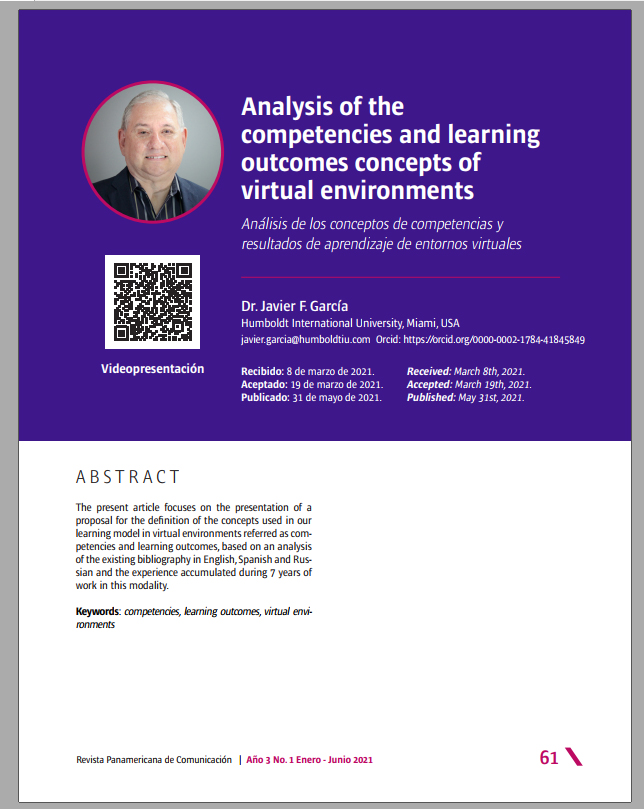Analysis of the competencies and learning outcomes concepts of virtual environments
Main Article Content
Abstract
The present article focuses on the presentation of a proposal for the definition of the concepts used in our learning model in virtual environments referred as competencies and learning outcomes, based on an analysis of the existing bibliography in English, Spanish and Russian and the experience accumulated during 7 years of work in this modality.
Article Details
Keywords:
References
Adam Manley, R., & Zinser, R. (2012). A Delphi study to update CTE teacher competencies. Education+ Training, 54(6), 488-503.
Bereczki, E. O., & Karpati, A. (2018). Teachers’ beliefs about creativity and its nurture: A systematic review of the recent research literature. Educational Research Review, 23, 25-56.
Biggs, J. (1999). What the student does: Teaching for enhanced learning. Higher education research & development, 18(1), 57-75.
Brown, S., & Knight, P. (2012). Assessing learners in higher education. Routledge.
Burke, J. W. (Ed.). (1989). Competency based education and training. Psychology Press.
Kennedy D. 2006. Writing and using learning outcomes: a practical guide, Cork, University College Cork.
Kennedy, D., Hyland, A., & Ryan, N. (2009). Learning outcomes and competences. Introducing Bologna Objectives and Tools, 2-3.
Jenkins, A., & Unwin, D. (2001). How to write learning outcomes. Disponible en https://www.ubalt.edu/cas/faculty/faculty-matters/How%20to%20write%20student%20learning%20outcomes.
Leadbeater, C. (2008). What’s Next?: 21 Ideas for 21st Century Learning. Innovation Unit.
Le Boterf, G. (2010). Agir et réussir avec compétence (5e édition). In Construire les compétences individuelles et collectives.
Lobanova, T., & Shunin, Y. (2008). Competence-based education: A common European strategy. Computer Modelling and New Technologies, 12(2), 45-65.
McLoughlin, C., & Lee, M. (2008). Mapping the digital terrain: New media and social software as catalysts for pedagogical change. Hello! Where are you in the landscape of educational technology? Proceedings ascilite Melbourne 2008, 641-652.
Moon, Y. L. (2007). Education reform and competency-based education. Asia pacific education review, 8(2), 337-341.
Mulder, M., Weigel, T., & Collins, K. (2007). The concept of competence in the development of vocational education and training in selected EU member states: a critical analysis. Journal of Vocational Education & Training, 59(1), 67-88.
Tobón S., (2010). Formación integral y competencias. Pensamiento complejo, currículo, didáctica y evaluación, 3a ed., Centro de Investigación en Formación y Evaluación CIFE, Bogotá, Colombia, ECOE Ediciones.
Winterton, J., Mulder, M., Gulikers, J., Biemans, H., & Wesselink, R. (2009). The new competence concept in higher education: error or enrichment?. Journal of European industrial training. Vol. 33 No. 8/9, 2009 pp. 755-770.
Zimnyaya, I. A. (2003). Key Competencies-a new paradigm of education result. Higher education today, 5, 34-42.
Bereczki, E. O., & Karpati, A. (2018). Teachers’ beliefs about creativity and its nurture: A systematic review of the recent research literature. Educational Research Review, 23, 25-56.
Biggs, J. (1999). What the student does: Teaching for enhanced learning. Higher education research & development, 18(1), 57-75.
Brown, S., & Knight, P. (2012). Assessing learners in higher education. Routledge.
Burke, J. W. (Ed.). (1989). Competency based education and training. Psychology Press.
Kennedy D. 2006. Writing and using learning outcomes: a practical guide, Cork, University College Cork.
Kennedy, D., Hyland, A., & Ryan, N. (2009). Learning outcomes and competences. Introducing Bologna Objectives and Tools, 2-3.
Jenkins, A., & Unwin, D. (2001). How to write learning outcomes. Disponible en https://www.ubalt.edu/cas/faculty/faculty-matters/How%20to%20write%20student%20learning%20outcomes.
Leadbeater, C. (2008). What’s Next?: 21 Ideas for 21st Century Learning. Innovation Unit.
Le Boterf, G. (2010). Agir et réussir avec compétence (5e édition). In Construire les compétences individuelles et collectives.
Lobanova, T., & Shunin, Y. (2008). Competence-based education: A common European strategy. Computer Modelling and New Technologies, 12(2), 45-65.
McLoughlin, C., & Lee, M. (2008). Mapping the digital terrain: New media and social software as catalysts for pedagogical change. Hello! Where are you in the landscape of educational technology? Proceedings ascilite Melbourne 2008, 641-652.
Moon, Y. L. (2007). Education reform and competency-based education. Asia pacific education review, 8(2), 337-341.
Mulder, M., Weigel, T., & Collins, K. (2007). The concept of competence in the development of vocational education and training in selected EU member states: a critical analysis. Journal of Vocational Education & Training, 59(1), 67-88.
Tobón S., (2010). Formación integral y competencias. Pensamiento complejo, currículo, didáctica y evaluación, 3a ed., Centro de Investigación en Formación y Evaluación CIFE, Bogotá, Colombia, ECOE Ediciones.
Winterton, J., Mulder, M., Gulikers, J., Biemans, H., & Wesselink, R. (2009). The new competence concept in higher education: error or enrichment?. Journal of European industrial training. Vol. 33 No. 8/9, 2009 pp. 755-770.
Zimnyaya, I. A. (2003). Key Competencies-a new paradigm of education result. Higher education today, 5, 34-42.


